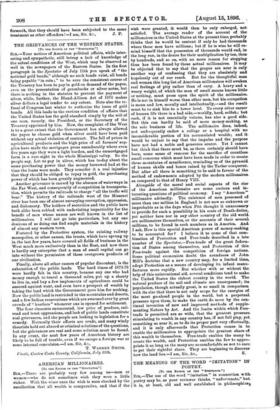THE MEANING OF THE WORD "IMITATION" IN POETRY.
[To THE EDITOR OF THE " SPTCTATOR."1 [To THE EDITOR OF THE " SPTCTATOR."1
SIR,—The use of the word "imitation" in connection with poetry may be, as your reviewer thinks, " unfortunate," but it is, at least, old and well established in philosophical, criticism; and the failure of your reviewer to recognise this established sense of the word has caused him completely to misunderstand the meaning of my lecture on " Poetical Conception," which he discusses in the Spectator of August 8th. Aristotle, at the very opening of his "Poetics," says :—" Epic
Poetry, Tragedy, Comedy, Dithyrambics all these are, in the most general view of them, Imitations ; " and Professor Butcher, in his very luminous commentary on Aristotle's work, shows what he means by the expression. Sir Joshua Reynolds, applying the word " imitation " to the art of painting, takes the precaution, in his sixth discourse, to explain that he does not mean by it the exact copying of external things. I confess that it never occurred to me to suppose that any one who would be likely to discuss my lecture would imagine that I was using the word in that sense. Perhaps I ought to have anticipated such an objection. But I venture to think that your critic should at least have been put on his guard by such a sentence as this :- " We have to remember that Fine Art does not, like photography, imitate real Nature, but the idea of Nature existing in the mind." To imitate Nature in poetry, or in any of the fine arts, is to invent for ideas, existing vaguely and embryonically in the mind in general, a form of expres- sion so distinct and beautiful, that it is universally felt to be the true form. I see no difficulty in applying this principle to any of those passages which your critic justly cites as specimens of true poetry. Nor do 1 find myself in disagree- ment with the words he uses to describe the effect of a true poem,—namely, that "it draws from the deeper experience of the poet's own mind those original touches which interpret for us what we have dimly felt, and positively enlarges the sphere of our inward life." Unless, indeed, he means by these words to maintain that the poet provides matter as well as form for his audience ; that he puts entirely new ideas into their minds, instead of providing new and true forms for pre-existing ideas.
I should be sorry to find that a critic with whom I do not see any substantial reason to disagree refuses to " acquiesce in" my "definition" when he knows what it means ; but if I am, even then, unable to persuade him, he must not, I think, induce others to reject it by imputing to it a meaning which it was never intended to bear, and which the whole tenor of my argument shows that it could not possibly bear.—I am,



































 Previous page
Previous page